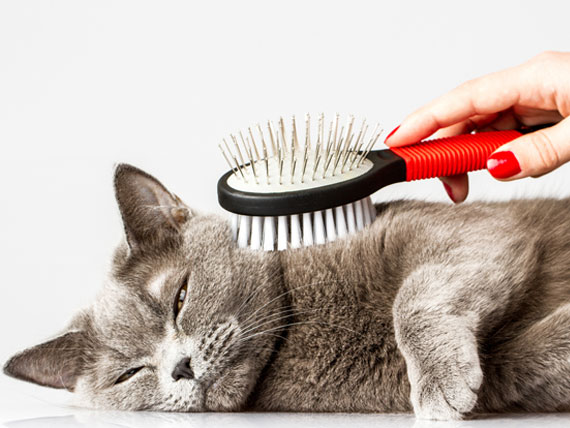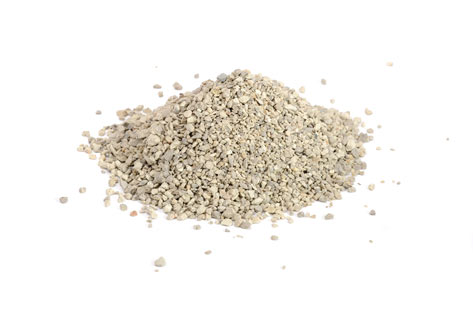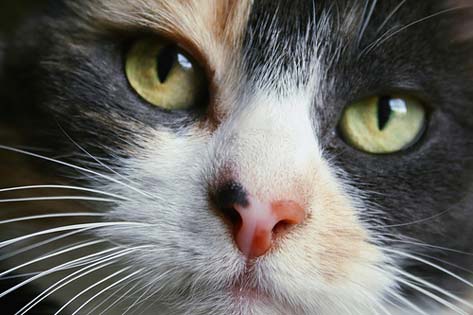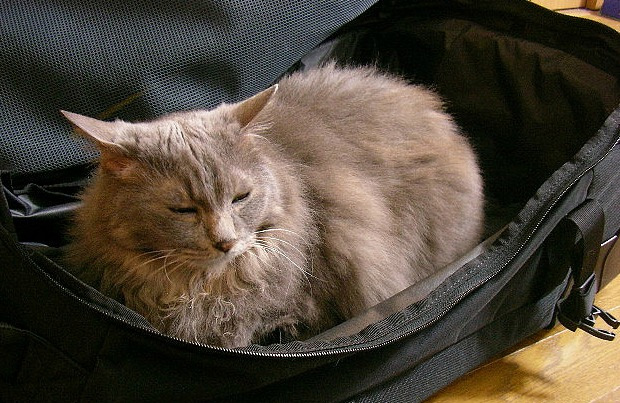Once thought of as typically a dog parasite, recent studies have shown the disease to be on the rise in cats, and it now occurs with about equal frequency in both.
The heartworm parasite, Dirofilaria immitis, is, at the end of its lifecycle, a 9-11-inch worm from the same class as the human roundworm. Cats are often found with up to four in their heart at one time.
Heartworms have been identified in domesticated dog, cats, and ferrets, as well as wild foxes, wolves, and California sea lions. There have also been a number of incidences of the parasite in humans.
In cats, the worm lives in the cavities of the heart and the vessels surrounding it.
Transmitted by mosquitoes, the worm cannot be transferred from cat to cat. Its life cycle requires that it pass through a mosquito first. Here’s how it works:
The Life Cycle
In an infected cat, the adult heartworms release larvae called microfilaria that live circulating in the cat’s blood for up to a month.
When a mosquito bites an infected cat, it sucks up the blood containing the microfilaria. The microfilarium mature in the mosquito’s blood stream for 2-3 weeks and then travel to the mosquito’s mouth. Now, when the mosquito bites another cat, the microfilaria is transmitted into the cat’s blood stream.
To complete the cycle, the implanted microfilaria spends another 2-3 more months maturing in the cat’s bloodstream, migrating finally to the heart where it lives as an adult and completes the cycle. This whole process takes about eight months, but worms can live up to two years. Compare this to 5-7 years in dogs.
Heartworm Associated Respiratory Disease
Although cat heartworms live mainly in the heart, respiratory problems resulting from heartworm are much more common and severe. For this reason, heartworm disease in cats is usually referred to as �Heartworm Associated Respiratory Disease� or �HARD�.
While many cats will show no symptoms, some common presentations of the disease are:
Coughing or difficulty breathing; loss of appetite, weight loss or vomiting; a kind of general malaise; rapid resting heart rate; and fainting. More severe symptoms are seizures and sudden death.
Diagnosing Cat Heartworm
A cat cannot be treated for heartworm unless it is confirmed that the cat is infected and that the infection is active.
Blood tests in cats can be rather unreliable, so a combination of x-rays and echocardiography are the quickest route to an accurate diagnosis. However, more dependable antibody and antigen tests are being developed that can be performed in your vets office. Inquire with him or her about these.
Treating Heartworm
Because of the short lifespan of the heartworm in cats, some veterinarians suspecting heartworm will let the disease run its course and hope the cat outlives the disease.
Infected cats are usually treated with doses of corticosteroids to control inflammation in the lungs and given monthly prophylactic treatments to prevent new heartworms from forming.
It should be noted that in a few cases, veterinarians removed worms through surgery.
Cats infected with adult heartworms are sometimes administered what are called �adulticide drugs� to help kill off the worms. These should not be confused with preventative drugs. Some preventative drugs can have serious side effects when given to a cat harboring an adult heartworm, which is why it is important to have your cat tested before giving him or her any type of preventative medication.
Also, when ordering preventative medication for a cat, be sure to order the cat version of the medication. Giving your cat heartworm medication meant for dogs could have grave consequences.
Preventing Heartworm
Because HARD can be such a serious problem it is important to take preventative measures before your cat gets sick. While one way to prevent the disease is to control the mosquito population in your house and around your property, here are a few common medications used that work well:
Heartgard
Heartgard is pretty much the industry standard. It comes in tablets, chewable tablets, or a topical solution, administered once a month.
It works by killing off any microfilaria the cat may have acquired in the past 30 days and the topical solution can be used to treat ear mites as well.
The Heartgard tablets are excellent and you can even buy treats to put the capsules in so the cat will have no problem eating the pill. It’s nice to only have to give it once a month, and you buy it as a one-year supply, so you only have to buy it once a year.
Interceptor Flavor Tabs
Another flavored tablet that your cat will be excited to eat, Interceptor tabs will prevent heartworm, as well as control and remove hookworm, roundworm, and whipworm.
These are similar to Heartgard tablets, except Heartgard is the drug Ivermectin and Interceptor is made from the drug milbemycin oxin.
Interceptor tablets may be a bit more aggressive a treatment. Be sure to discuss your options with your veterinarian.

 Cat Hairball Problems? Learn Why They Happen and How to Help
By Jennifer Coates, DVM
Ha
Cat Hairball Problems? Learn Why They Happen and How to Help
By Jennifer Coates, DVM
Ha
 What is in Cat Litter?
Understanding Clay, Silica and Biodegradable C
What is in Cat Litter?
Understanding Clay, Silica and Biodegradable C
 Why Do Cats Have Whiskers?
By Yahaira Cespedes
Cats possess m
Why Do Cats Have Whiskers?
By Yahaira Cespedes
Cats possess m
 10 Tips for a Happy and Healthy Kitten
Getting a new kitten is one of the best things in the wo
10 Tips for a Happy and Healthy Kitten
Getting a new kitten is one of the best things in the wo
 The Best Way to Take Your Cat on Vacation With You
by Cheryl Lock
Vacation is supposed to
The Best Way to Take Your Cat on Vacation With You
by Cheryl Lock
Vacation is supposed to